Intercultural Learning & Engagement
Diversity & Belonging. We’re Serious Because It Matters.
The Diversity and Inclusion agenda at Bethel University is an institutional response to achieve academic and institutional excellence.
We aim to address the needs and inequalities of historically disadvantaged individuals or groups, while fostering a learning environment and inclusive community for all students, faculty and staff to succeed in an increasingly diverse society. These groups include students of color, low-income students, first-generation students, women, the Deaf community, and University employees.
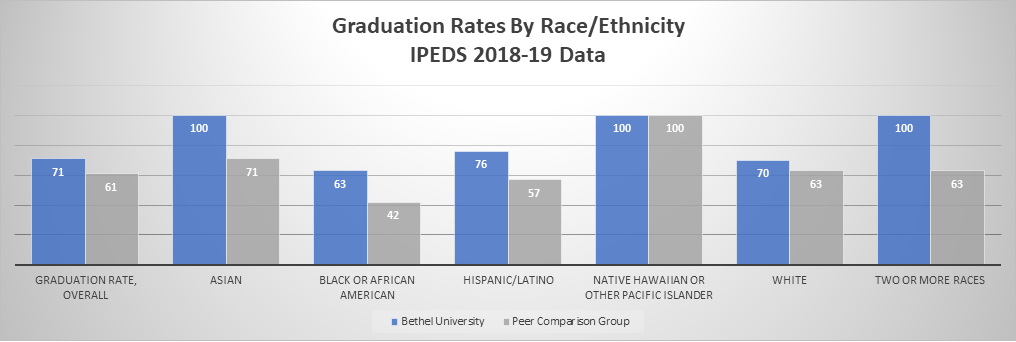
According to data from the most recent IPEDS (Integrated Postsecondary Education Data System) report, Bethel University is a leader among its peers in graduating students of color. The graph above shows that Bethel’s overall graduation rate of 71% is 10% higher than that of our peer comparison group, which consists of nine schools in our region with similar size, mission and demographics. It also shows that graduation rates among students of color were also higher overall vs. our peer comparison group – 29% higher for Asian students, 21% higher for Black or African American Students, 19% higher for Hispanic/Latino students and 37% higher for students of two or more races.
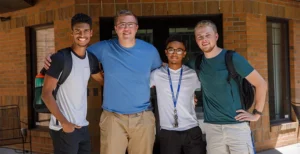
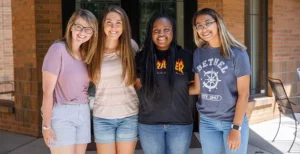
Our Focus
A Biblical Basis for Diversity
God teaches in Scripture that the human race is one.
“From one man God made every nation of the human race, that they should inhabit the whole earth” (Acts 17:26).
God teaches in Scripture that the human race is one. As Paul preached to the Athenian philosophers, “From one man God made every nation of the human race, that they should inhabit the whole earth” (Acts 17:26). It is within this greater context of unity that humanity’s diversity rightly appears. Human diversity is first mentioned in Genesis 1:27, with the creation of the one human race: “So God created the human race in his own image . . . male and female he made them.” The text’s singular term, “human race,” is characterized as diverse in gender: male and female. Diversity is immediately advanced in the cultural mandate of Genesis 1:28: “Be fruitful, increase in number, fill the earth and subdue it.” This great command calls explicitly for the scattering of the race, a theme that recurs in Genesis, implicitly calling for cultural diversity.
Cultural diversity is a proper expression of the cultural mandate.
“From them came the people who were scattered over the earth” (Genesis 9:19).
Later, after naming Noah’s three sons, Genesis recounts how “from them came the people who were scattered over the earth” (9:19). This reference to “scattering” hints at the dual nature of cultural diversity in Scripture. On the one hand, cultural diversity is a proper expression of the cultural mandate: by scattering and filling the earth, humanity subdues it piece by piece. On the other hand, it is an expression of the curse enacted at Babel in response to humanity’s monocultural attempt to live in defiance of God: “. . . as one people speaking one language they have begun to do this. . . . Come, let us go down and confuse their language. . . . So the Lord scattered them over the earth” (11:6‑8).
It is precisely these dispersed and alienated peoples that God calls to faith and repentance through the gospel’s ministry of reconciliation. God chose one person, Abraham, to be a blessing to the world. As God promised him, “all the peoples on earth will be blessed through you” (Genesis 12:3). Such blessedness does not terminate the diversity of the peoples. That was the mistake of the Judaizers, who sought to convert Gentiles into Jews before they could be received into the church as Christians. Rather, the blessedness of reconciliation affirms the potential validity of a multitude of cultural expressions.
The Universal Church has an inherent and God‑given diversity.
“The body is a unit, though it is made up of many parts . . . so it is with Christ” (1 Corinthians 12:12).
As people from various ethnicities come to faith in Jesus Christ, he reconciles them to God the Father and therefore to each other. Thus, the Universal Church has an inherent and God‑given diversity. As Paul wrote to the divisive Christians at Corinth, “The body is a unit, though it is made up of many parts . . . so it is with Christ” (1 Corinthians 12:12). Paul himself experienced a rich and blessed diversity in the church of Syrian Antioch, where for the first time Jewish and Gentile Christians worshiped God together on equal footing (Acts 11:19‑26). John the beloved similarly witnessed a glimpse of diversity in heaven as he viewed “a great multitude that no one could number, from every nation, from all tribes and peoples and languages, standing before the throne and before the Lamb, clothed in white robes, with palm branches in their hands, and crying out with a loud voice, ‘Salvation belongs to our God who sits on the throne, and to the Lamb!’” (Rev. 7:9)
As it is in heaven, so let it be on earth, at Bethel, we pray.
Mission
The mission is to educate, engage and empower the Bethel University community through collaborations and resources to achieve academic and institutional excellence while fostering an inclusive campus climate.
The agenda supports our mission to provide liberating academic and co-curricular programs to challenge the mind, enlarge the vision and equip the whole person for lifelong service. It is our desire to see God’s will done on earth as it is in heaven and to exemplify God’s love and grace in the pursuit of excellence.
Campus Leadership Goals for Our Three Principles
Access & Retention
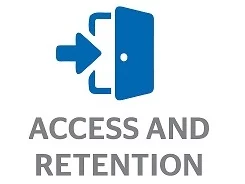
Improve the recruitment and retention of students, faculty and staff of color.
Inclusive Campus Climate
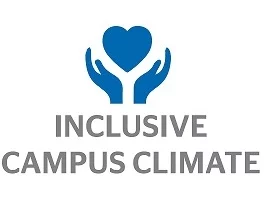
Create a hospitable environment for all students, faculty and staff to experience acceptance, belonging and feel empowered to engage in the campus culture as a valued member of our community.
Community Partnerships
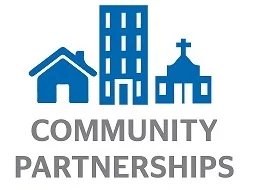
To serve the larger Michiana community by providing opportunities of community engagement through collaboration and programs sponsored by Bethel.
Programs
Dr. Billy Kirk Leadership Program
The Dr. Billy Kirk Leadership program honors a man who served as a pastor and leader in the South Bend community for almost 50 years. In addition to being a Bethel University student in the 1950s, Rev. Kirk received an honorary doctorate from Bethel in 2001, recognizing his commitment of social justice to the South Bend/Mishawaka community. He embodied the intellectual curiosity, desire for stronger community and spiritual commitment for which we all should strive.
The scholarship is awarded to students of color who demonstrate a commitment to peace, community service and social justice. The award is based on the student’s academic record, personal interview, essay, reference letters, leadership involvement and financial need. Finalists are required to live on campus and attend a summer retreat. Contact the Office of Admissions by email or apply online.
Participants in the program engage in regular learning activities, coaching sessions, and campus leadership roles.
Referred to around campus as BK Scholars, these students are active members of the campus community who help lead a variety of formal and informal diversity initiatives.
Ekome’ (Black Student Fellowship)
Black Student Fellowship serves to create, cultivate, and challenge students at Bethel University through community service, entertainment and quality programs. This organization strives to provide social support for students of color, as well as create an environment for anyone who would like to learn more about African American culture. All students are welcome to join!
UNIDOS (Latin Student Fellowship)
UNIDOS, Spanish for the word “united”, is the Latino student fellowship that centers around students across campus of Latino descent and non-Hispanic backgrounds. UNIDOS seeks to cultivate, explore, and celebrate Latin American countries, experiences, and traditions. The purpose of UNIDOS is to provide a space to create community and belonging for Latino students. UNIDOS’ presence can be seen through cultural events hosted by members, participating in community service events, and creating opportunities for Latino students to engage with other Latino students on campus. UNIDOS’ sense of community, diversity, and inclusivity is motivated by God’s love for all. By empowering and celebrating the different cultures, people, and voices on our campus, we honor the diversity in the world that God has created.
International Student Fellowship
International Student Fellowship provides a “home away from home” for students who have traveled to the United States to study. Monthly gatherings give the students an opportunity to experience local American culture, share experiences, enjoy ethnic foods, and fellowship with other international students. The club is also open to those students who have lived abroad or have an interest in learning firsthand about other cultures. Learn more about campus life for international students.
Intercultural Living – Learning Community
This housing is designed to foster cross-cultural understanding, humility, and appreciation among students from different backgrounds. The Intercultural living-learning houses provide a humble and receptive environment for students to learn about and celebrate the beauty within one another’s cultures and experiences. Residents will be encouraged to learn more about their own heritage and history, engage in meaningful dialogue, and develop the skills and awareness to be thoughtful global citizens.
Bethel is a hub for students from all around the world to come and learn together, with alumni from a multitude of cultures, races, and experiences. Furthermore, Bethel’s physical campus is surrounded by a variety of communities and neighborhoods that host a diverse array of people. This living-learning community will strive to embrace the cultures and realities of its members and become bridge builders who recognize both uniqueness and commonality among people.
Recent Events & Position Statements
- Jan. 18, 2021
President’s Message for Martin Luther King Jr. Day (PDF) - Nov. 13, 2020
Board of Trustees Statement on Racial Diversity, Equity and Inclusion (PDF) - Aug. 24, 2020
One Question You Should Never Ask (PDF)
With application to racial injustice - June 19, 2020
Juneteenth Letter from President Chenoweth (PDF) - June 2, 2020
Letter of Lament (PDF) - Feb. 14, 2020
Statement on “The Race Card Project” (PDF) - Dec. 19, 2019
The Justice of Jesus – Chapel message (PDF) - July 2016
Bethel College Statement on Race Tensions, National Mourning and Remedy (PDF)